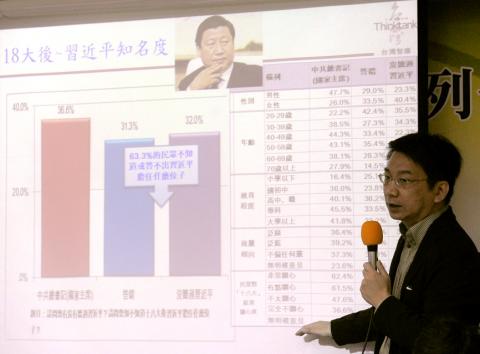A public opinion poll published yesterday found that the majority of respondents were concerned that Taiwan’s fiscal problems could lead the nation to face an economic crisis similar to Greece’s and felt pessimistic about President Ma Ying-jeou’s (馬英九) pension reforms.
Asked if they were concerned that the nation’s debt crisis could turn it into another Greece, 70.7 percent of the respondents said yes, a survey conducted by the Taiwan Thinktank from Wednesday to Friday showed.
In addition, 72.9 percent of those polled said the holding of a national affairs conference, as proposed by the opposition parties, was necessary to address the gravity of the fiscal issues.

Photo: CNA
Only 24.6 percent of the respondents said they were not worried about possible “Hellenization,” said Hsu Yung-ming (徐永明), convener of the think tank’s survey team, at a press conference yesterday.
The survey also found that 67.6 percent of those questioned had no confidence in Ma’s pledge to submit a complete plan on pension reform in January that would improve the nation’s finances, compared with 18.2 percent who said they felt confident about the promise.
The average age of retirement among the survey’s participants was 58.5 years and the average expected monthly pension for an affordable retirement life was NT$28,602.
Ma’s disapproval rating was at its lowest — 70.5 percent — since the thinktank began to conduct the monthly surveys in March, the poll showed, despite his approval rating of 21.1 percent being slightly up from last month’s 19.3 percent.
The poll also showed that most people did not oppose Ma’s “bumbler” tag, given by UK-based weekly magazine The Economist recently and which led to much controversy.
Asked about the article and the term “bumbler” — whose translation was the subject of debate in local media — 57.1 of the respondents said it meant Ma was “indecisive,” 18.3 percent said it mean the president was “stupid” and 7.2 percent said it meant both.
Most of those polled — 74.9 percent — did agree on one thing: The report has seriously damaged Taiwan’s international image.
On the elections in special municipalities, cities and counties in 2014, the poll found that 33.9 percent of respondents supported the Democratic Progressive Party (DPP), while 22.6 percent were for the Chinese Nationalist Party and 43.5 percent were undecided.
The DPP’s increased exchanges with Beijing were approved by 57.1 percent of survey participants, while 23.4 percent disapproved.
While most of those surveyed agreed with the party’s drive to better understand China and 67.2 percent said they were aware of the Chinese Communist Party’s 18th Party Congress, the poll found that 63 percent either did not know who Chinese Vice President Xi Jinping (習近平) was, or could not name his position.
The poll collected 1,072 samples and had a margin of error of 3 percentage points.

Japanese footwear brand Onitsuka Tiger today issued a public apology and said it has suspended an employee amid allegations that the staff member discriminated against a Vietnamese customer at its Taipei 101 store. Posting on the social media platform Threads yesterday, a user said that an employee at the store said that “those shoes are very expensive” when her friend, who is a migrant worker from Vietnam, asked for assistance. The employee then ignored her until she asked again, to which she replied: "We don't have a size 37." The post had amassed nearly 26,000 likes and 916 comments as of this

US President Donald Trump said "it’s up to" Chinese President Xi Jinping (習近平) what China does on Taiwan, but that he would be "very unhappy" with a change in the "status quo," the New York Times said in an interview published yesterday. Xi "considers it to be a part of China, and that’s up to him what he’s going to be doing," Trump told the newspaper on Wednesday. "But I’ve expressed to him that I would be very unhappy if he did that, and I don’t think he’ll do that," he added. "I hope he doesn’t do that." Trump made the comments in

Tourism in Kenting fell to a historic low for the second consecutive year last year, impacting hotels and other local businesses that rely on a steady stream of domestic tourists, the latest data showed. A total of 2.139 million tourists visited Kenting last year, down slightly from 2.14 million in 2024, the data showed. The number of tourists who visited the national park on the Hengchun Peninsula peaked in 2015 at 8.37 million people. That number has been below 2.2 million for two years, although there was a spike in October last year due to multiple long weekends. The occupancy rate for hotels

A cold surge advisory was today issued for 18 cities and counties across Taiwan, with temperatures of below 10°C forecast during the day and into tonight, the Central Weather Administration (CWA) said. New Taipei City, Taipei, Taoyuan and Hsinchu, Miaoli and Yilan counties are expected to experience sustained temperatures of 10°C or lower, the CWA said. Temperatures are likely to temporarily drop below 10°C in most other areas, except Taitung, Pingtung, Penghu and Lienchiang (Matsu) counties, CWA data showed. The cold weather is being caused by a strong continental cold air mass, combined with radiative cooling, a process in which heat escapes from